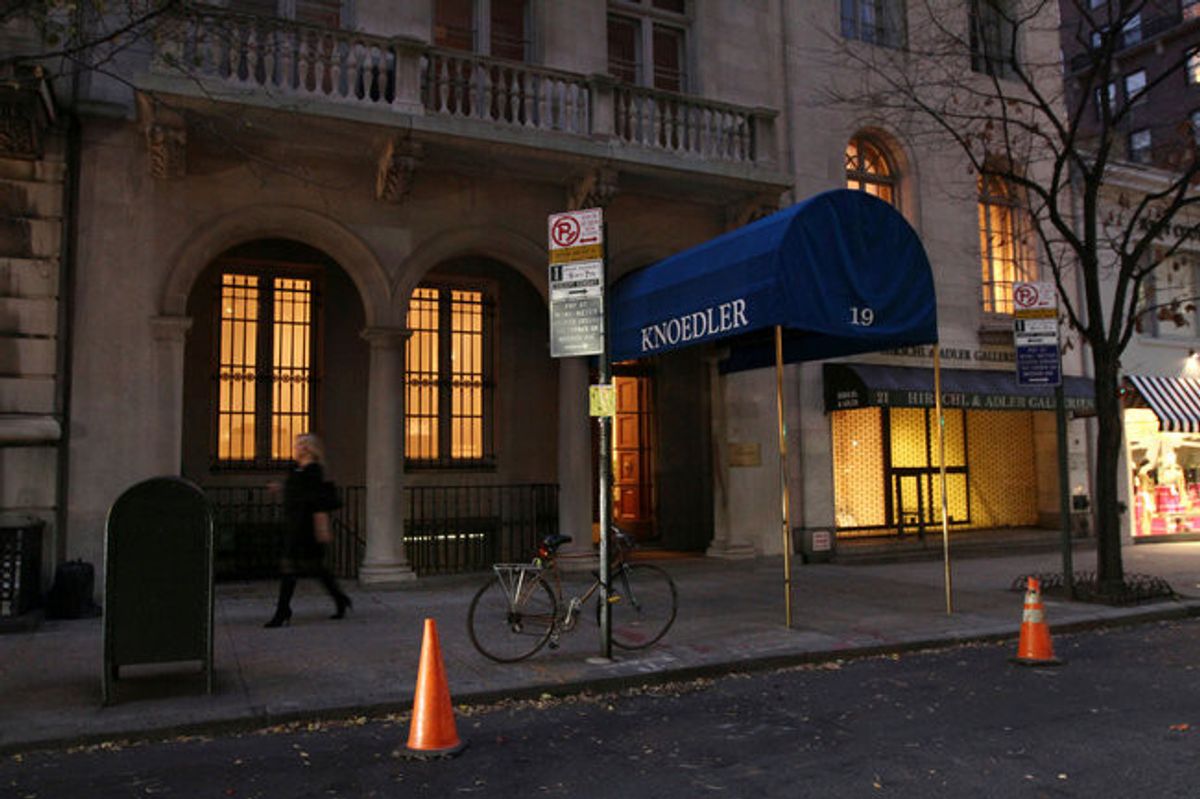In a victory for two collectors who bought fake works from the now-defunct Knoedler gallery, the federal district court in Manhattan in large part rejected a motion to dismiss two lawsuits brought against Knoedler, its former director Ann Freedman, and Glafira Rosales, the art dealer who brought fake paintings to Knoedler.
“We are very pleased,” says John Cahill, the lawyer for one of the collectors, John Howard. He bought a painting from Knoedler in 2007 that he was told was by Willem de Kooning but that turned out to be fake. The other lawsuit has been brought by Domenico and Eleanore De Sole, who purchased a counterfeit work that they were told was by Rothko in 2004.
The collectors say that Knoedler, Freedman and Rosales knowingly sold them fakes, and engaged in a corrupt racketeering enterprise (commonly called a “Rico” crime. A successful Rico claim allows plaintiffs to recover triple damages). The court has dismissed the Rico claims in Howard’s suit but he plans to file an amended complaint, his lawyer says. The De Soles Rico claims have been upheld.
The collectors’ suits also made fraud claims under New York state law, saying they purchased the fakes because Freedman allegedly misstated their authenticity and provenance. These claims have been upheld in both cases.
In the ruling made on Monday 30 September, the court only considered whether the collectors could support their claims with enough factual allegations and did not decide whether the defendants had engaged in any actual fraud.
Rosales pleaded guilty in September to federal charges, including money laundering and tax evasion, and admitted that the works she sold are fakes.
The 65-page decision, says: “The facts alleged in each complaint provide an ample record on which to conclude that Freedman, and Knoedler acting through Freedman, its president, participated or ‘played some part in directing’ the affairs of the alleged racketeering enterprise… [They] demonstrate that Freedman—in her capacity as Knoedler’s president—made numerous misrepresentations to Howard and the De Soles and their agents concerning the provenance and authenticity of the forged paintings they purchased. The complaints also plead facts more broadly demonstrating that Freedman likely knew… that her statements were false. For example, Freedman is alleged to have made numerous misrepresentations about… whether Rosales-related paintings would be included in upcoming catalogue raisonnés. Rosales’ shifting stories… and her inability to obtain any written corroboration or endorsement from the alleged owner, provide circumstantial evidence that Freedman… knowingly made materially false statements to Howard and the De Soles and their agents.”
The court rejected Knoedler and Freedman’s motion to dismiss on statute of limitations grounds.
Freedman has denied that she knew the works were fakes, and said in court papers that she consulted a number of experts about the works’ authenticity. Knoedler gallery has consistently denied any wrongdoing. Knoedler and Freedman also say the collectors should have investigated the paintings’ authenticity when they bought the works.
The court disagrees. About the De Soles, the court says: “They had ‘no reason to suspect the authenticity of their Painting’ at that time. The De Soles purchased the purported Rothko from Knoedler—at that time, the oldest and most venerable art gallery in New York City. Freedman, Knoedler’s president, ‘unequivocally, repeatedly, and consistently’ represented to the De Soles that the work was an authentic Rothko… In a… 2004 letter, Freedman confirmed many of her oral representations.”
The court’s decision quotes part of the letter, which states: “This classic Rothko painting was acquired directly from the artist” and concluded, “Knoedler warrants the authenticity and good title of the painting”. The letter “could hardly be more dispositive as to the authenticity of the Rothko,” the court says.
Freedman’s lawyer, Luke Nikas of Boies Schiller, says: “This is a motion on which the court must accept what the plaintiffs allege as true. We now know through discovery that the things alleged are demonstrably false.” He says they will file another motion to dismiss the suit.
The court has also ruled that there were insufficient facts to support claims made against Knoedler gallery’s owner, Michael Hammer, and his holding company, as well as Glafira Rosales’s longtime companion, Jose Carlos Bergantinos Diaz. They have been dismissed from both cases.


